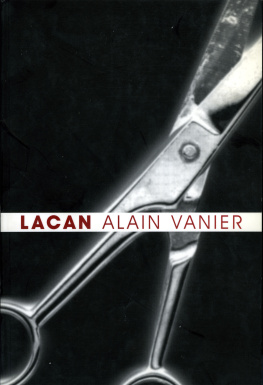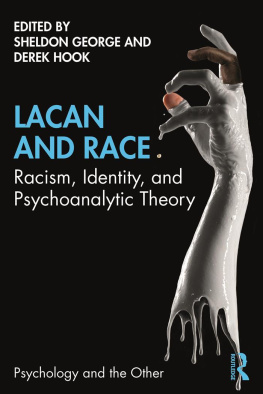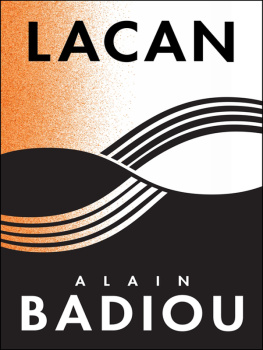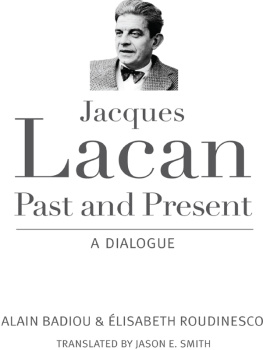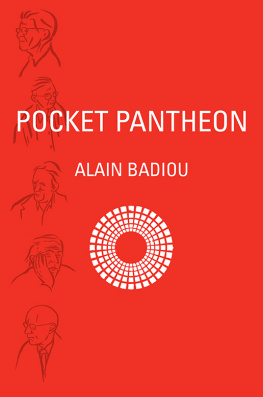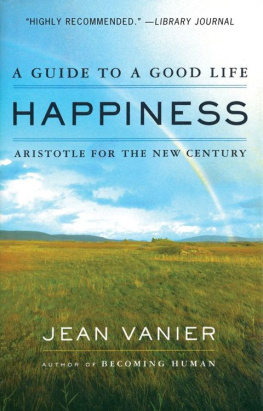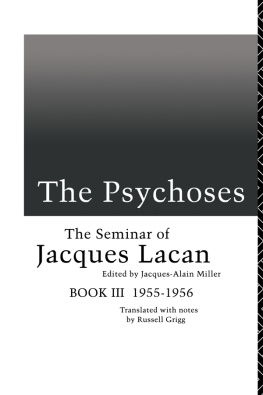Alain Vanier - Lacan
Here you can read online Alain Vanier - Lacan full text of the book (entire story) in english for free. Download pdf and epub, get meaning, cover and reviews about this ebook. year: 2020, publisher: Other Press, genre: Romance novel. Description of the work, (preface) as well as reviews are available. Best literature library LitArk.com created for fans of good reading and offers a wide selection of genres:
Romance novel
Science fiction
Adventure
Detective
Science
History
Home and family
Prose
Art
Politics
Computer
Non-fiction
Religion
Business
Children
Humor
Choose a favorite category and find really read worthwhile books. Enjoy immersion in the world of imagination, feel the emotions of the characters or learn something new for yourself, make an fascinating discovery.
- Book:Lacan
- Author:
- Publisher:Other Press
- Genre:
- Year:2020
- Rating:4 / 5
- Favourites:Add to favourites
- Your mark:
- 80
- 1
- 2
- 3
- 4
- 5
Lacan: summary, description and annotation
We offer to read an annotation, description, summary or preface (depends on what the author of the book "Lacan" wrote himself). If you haven't found the necessary information about the book — write in the comments, we will try to find it.
Lacan — read online for free the complete book (whole text) full work
Below is the text of the book, divided by pages. System saving the place of the last page read, allows you to conveniently read the book "Lacan" online for free, without having to search again every time where you left off. Put a bookmark, and you can go to the page where you finished reading at any time.
Font size:
Interval:
Bookmark:
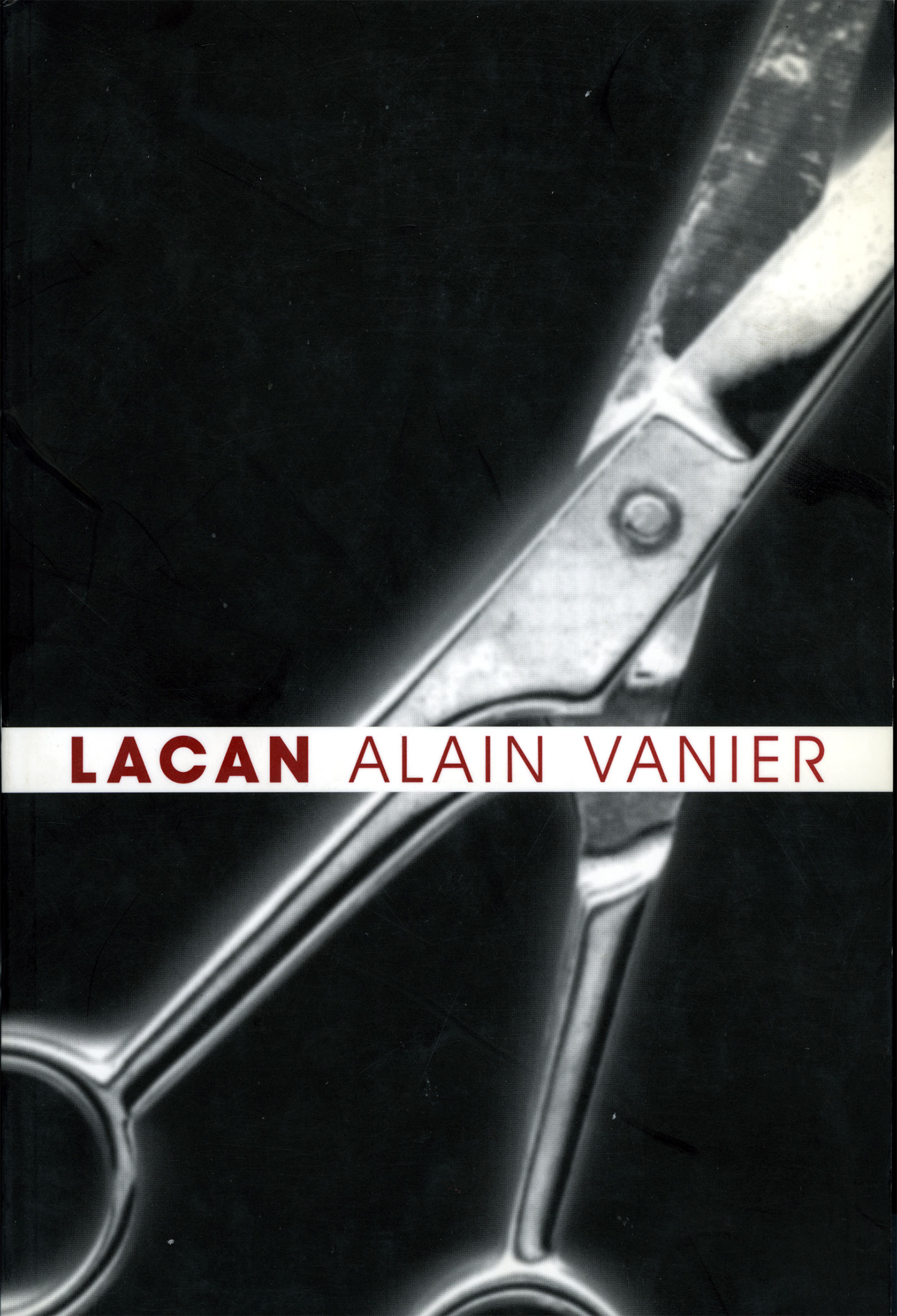
A series of books edited by
Judith Feher Gurewich, Ph.D.
in collaboration with Susan Fairfield
Introduction to the Reading of Lacan:
The Unconscious Structured Like a Language
Jol Dor
Lacan and the New Wave in American Psychoanalysis:
The Subject and the Self
Judith Feher Gurewich and Michel Tort, eds.
The Clinical Lacan
Jol Dor
Hysteria from Freud to Lacan: The Splendid Child of Psychoanalysis
Juan-David Nasio
Lacanian Psychotherapy with Children: The Broken Piano
Catherine Mathelin
Separation and Creativity: Refinding the Lost Language of Childhood
Maud Mannoni
What Does a Woman Want?
Serge Andr
Lacan in America
Jean-Michel Rabat, ed.
Lacan
Alain Vanier
Lacans Seminar on Anxiety
Roberto Harari, translated by Jane C. Lamb-Ruiz
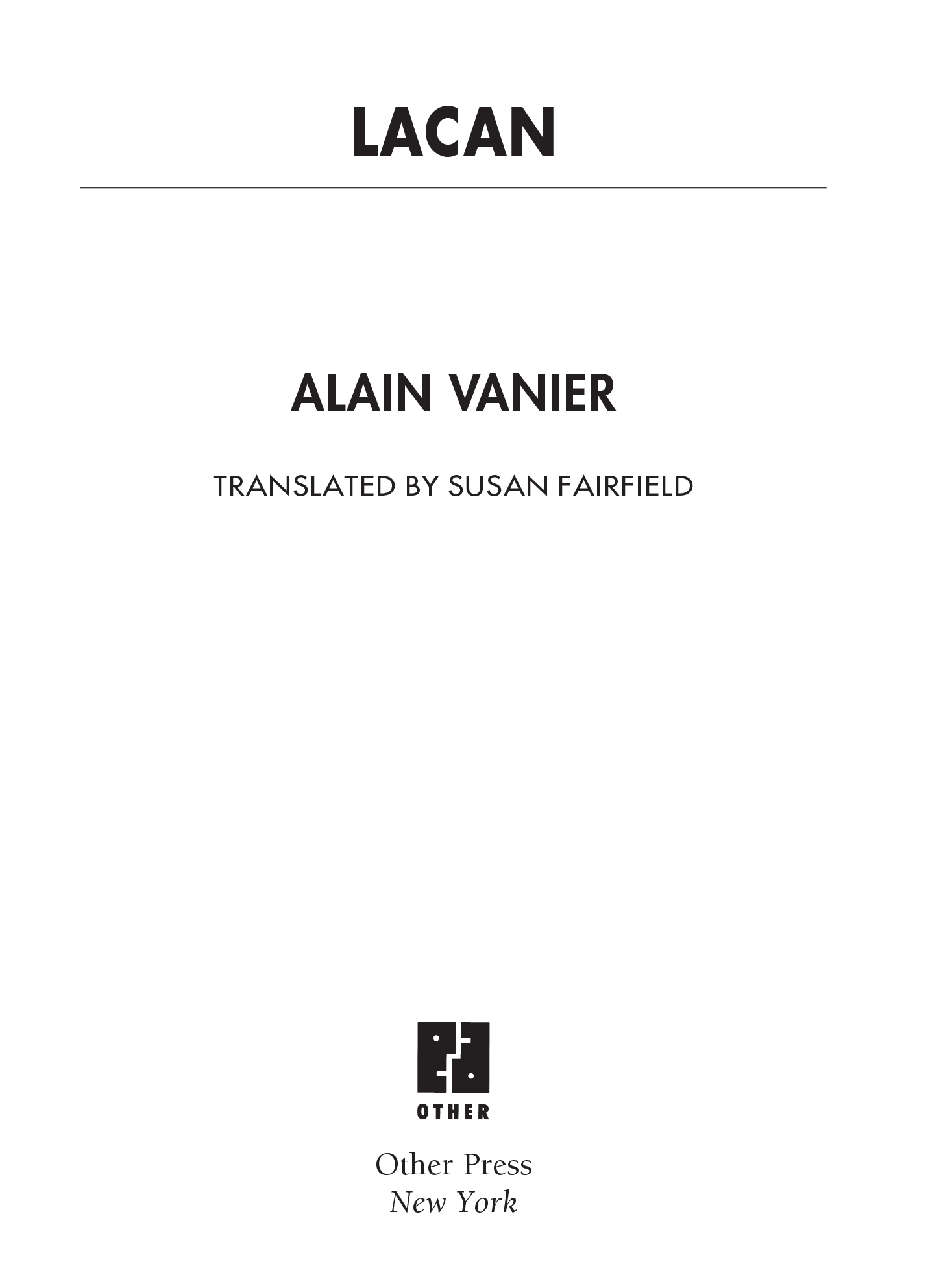
Copyright 2000 by Alain Vanier
Production Editor: Robert D. Hack
Ebook ISBN9781635421057
All rights reserved, including the right to reproduce this book, or parts thereof, in any form, without written permission from Other Press, LLC except in the case of brief quotations in reviews for inclusion in a magazine, newspaper, or broadcast. For information write to Other Press, LLC, 267 Fifth Avenue, 6th Floor, New York, NY 10016. Or visit our Web site: www.otherpress.com.
Library of Congress Cataloging-in-Publication Data
Vanier, Alain.
Lacan / Alain Vanier; translated by Susan Fairfield.
p. cm. (The Lacanian clinical field)
Includes bibliographical references and index.
ISBN 978-1-892746-50-4
1. Psychoanalysis. 2. Lacan, Jacques, 1901 I. Title. II. Series.
BF173.V28 2000
150.195092dc21 00-051639
a_prh_5.5.0_c0_r0
Lacanian psychoanalysis exists, and the ongoing series, The Lacanian Clinical Field, is here to prove it. The clinical expertise of French practitioners deeply influenced by the thought of Jacques Lacan has finally found a publishing home in the United States. Books that have been acclaimed in France, Italy, Spain, Greece, South America, and Japan for their clarity, didactic power, and clinical relevance will now be at the disposal of the American psychotherapeutic and academic communities. These books cover a range of topics, including theoretical introductions; clinical approaches to neurosis, perversion, and psychosis; child psychoanalysis; conceptualizations of femininity; psychoanalytic readings of American literature; and more. Thus far ten books are in preparation.
Though all these works are clinically relevant, they will also be of great interest to those American scholars who have taught and used Lacans theories for over a decade. What better opportunity for the academic world of literary criticism, philosophy, human sciences, womens studies, film studies, and multicultural studies finally to have access to the clinical insights of a theorist known primarily for his revolutionary vision of the formation of the human subject. Thus The Lacanian Clinical Field goes beyond introducing the American clinician to a different psychoanalytic outlook. It brings together two communities that have grown progressively estranged from each other. For indeed, the time when the Frankfurt School, Lionel Trilling, Erich Fromm, Herbert Marcuse, Philip Rieff, and others were fostering exchanges between the academic and the psychoanalytic communities is gone, and in the process psychoanalysis has lost some of its vibrancy.
The very limited success of ego psychology in bringing psychoanalysis into the domain of science has left psychoanalysis in need of a metapsychology that is able not only to withstand the pernicious challenges of psychopharmacology and psychiatry but also to accommodate the findings of cognitive and developmental psychology. Infant research has put many of Freuds insights into question, and the attempts to replace a one-body psychology with a more interpersonal or intersubjective approach have led to dissension within the psychoanalytic community. Many theorists are of the opinion that the road toward scientific legitimacy requires a certain allegiance with Freuds detractors, who are convinced that the unconscious and its sexual underpinnings are merely an aberration. Psychoanalysis continues to be practiced, however, and according to both patients and analysts the uncovering of unconscious motivations continues to provide a sense of relief. But while there has been a burgeoning of different psychoanalytic schools of thought since the desacralization of Freud, no theoretical agreement has been reached as to why such relief occurs.
Nowadays it can sometimes seem that Freud is read much more scrupulously by literary critics and social scientists than by psychoanalysts. This is not entirely a coincidence. While the psychoanalytic community is searching for a new metapsychology, the human sciences have acquired a level of theoretical sophistication and complexity that has enabled them to read Freud under a new lens. Structural linguistics and structural anthropology have transformed conventional appraisals of human subjectivity and have given Freuds unconscious a new status. Lacans teachings, along with the works of Foucault and Derrida, have been largely responsible for the explosion of new ideas that have enhanced the interdisciplinary movement pervasive in academia today.
The downside of this remarkable intellectual revolution, as far as psychoanalysis is concerned, is the fact that Lacans contribution has been derailed from its original trajectory. No longer perceived as a theory meant to enlighten the practice of psychoanalysis, his brilliant formulations have been both adapted and criticized so as to conform to the needs of purely intellectual endeavors far removed from clinical reality. This state of affairs is certainly in part responsible for Lacans dismissal by the psychoanalytic community. Moreover, Lacans impossible style has been seen as yet another proof of the culture of obscurantism that French intellectuals seem so fond of.
In this context the works included in The Lacanian Clinical Field should serve as an eye-opener at both ends of the spectrum. The authors in the series are primarily clinicans eager to offer to professionals in psychoanalysis, psychiatry, psychology, and other mental-health disciplines a clear and succinct didactic view of Lacans work. Their goal is not so much to emphasize the radically new insights of the Lacanian theory of subjectivity and its place in the history of human sciences as it is to show how this difficult and complex body of ideas can enhance clinical work. Therefore, while the American clinician will be made aware that Lacanian psychoanalysis is not primarily a staple of literary criticism or philosophy but a praxis meant to cure patients of their psychic distress, the academic community will be exposed for the first time to a reading of Lacan that is in sharp contrast with the literature that has thus far informed them about his theory. In that sense Lacans teachings return to the clinical reality to which they primarily belong.
Font size:
Interval:
Bookmark:
Similar books «Lacan»
Look at similar books to Lacan. We have selected literature similar in name and meaning in the hope of providing readers with more options to find new, interesting, not yet read works.
Discussion, reviews of the book Lacan and just readers' own opinions. Leave your comments, write what you think about the work, its meaning or the main characters. Specify what exactly you liked and what you didn't like, and why you think so.

